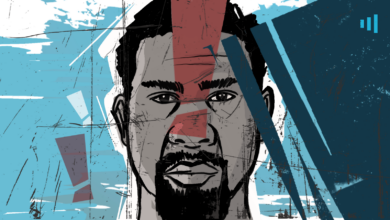Zamfara Residents Recall Nights Of Terror That Led To Turbaning Of Terrorist
Residents of Yandoto Emirate in Zamfara State, Northwest Nigeria, have expressed concern about the suspension of their emir, claiming that the traditional title bestowed on a terror leader was part of a reconciliation process.

Tijjani Umar was one of those who felt that giving a traditional title to Ado Aleiru (Aleru), a terror leader, was good news for the people of Yandoto in Zamfara State, Northwest Nigeria. But this feeling of hope was cut short when he learned that the emir responsible for this development, Alhaji Aliyu Shehu, was suspended.
Umar recounted his community’s ordeal before the reconciliation effort that opened the doors of peace in Yandoto and other communities within the emirate. A native of Gidan Dawa, a settlement under the emirate, he cannot forget how they were terrorised on a daily basis.
Prior to the decision by Shehu to turban Ado Aleiru, a notorious terrorist operating in the state, as Sarkin Fulanin Yandoto (Fulani King of Yandoto), the entire area was, according to residents, insecure. So much so that people found it hard to sleep at night as terrorists conducted constant raids where they kidnap and rape women and children.
“It was so disturbing that rearing a sheep was a direct invitation for an attack,” Mallam Yusuf, a local, said. The entire emirate was gloomy and tense, and everyone used to return home and brace themselves for the worst when darkness fell.
Farmers were among the hardest hit. “Even if your farmland is close to your house, your mind would be full of terror,” he said.
Umar, another resident, recalled how his family spent all their money on paying ransom to kidnappers. To add to this, most of their property were confiscated. They spared no one in his village, including “men, women, and children.”
Then, a week before the Eid celebrations, Aleiru, who was declared wanted for murdering over 100 people at the time, called for a reconciliation meeting with Yandoto elders. He stated that he desired peace with the Yandoto emirate and its communities.
The communities were overjoyed because that was all they had hoped for. Following the meeting, Aleiru began to follow through on his promises, and peace began to reign. Some confiscated properties were returned to their rightful owners, and the attacks ceased.
It was against this backdrop that the Yandoto Emirate decided to reward Alieru in order to keep the peace. The emir announced that he would turban Aleiru as the Sarkin Fulanin Yandoto, which caused quite a stir.
While some see the terrorist’s turbanning as a reward for killing many people and displacing others, security analysts such as Yusuf Anka argued that the defenseless emirate and its communities have no choice but to contain the terrorist by offering him a chieftaincy title.
Despite the controversy, the emirate went ahead and turbaned Aleiru in the presence of the police officers who had declared him wanted a week later. “The commissioner for internal security, as well as the chairman of the local government, were all present,” Yusuf said, implying that the government was aware of the turbaning ceremony.
Residents who spoke with HumAngle said that turbanning Aleiru as a means of establishing peace in their communities was in their best interests. “We in the communities who have witnessed the worst of it know that the turbanning was not bad. People who are not involved in the conflict are the ones who say it was bad,” Sharhabilu, a local, told HumAngle.
The spokesperson of the emirate, Lawal Magaji, later told journalists that Aleiru is considered as a peace-maker within the emirate and said the chieftaincy title will make residents move freely and peacefully. “With this development, the people of the emirate can now go to their farms without fear of bandit attacks.
“He has been trying to stop banditry within the emirate and we have seen positive changes. The conferment of the title of Sarkin Fulani on Adoi Aleru would give him more power to control the entire Fulani people within the emirate. It will also enable him to check the activities of the recalcitrant bandits and take action against them within the emirate.
“I want to use this medium to appeal to the entire people of the state to look at this as the best option to address the issue of banditry. This is because the bandit leader has repented and is now fighting those who have refused to surrender,” he said.
The worst that could happen
After Aleiru was turbaned Sarkin Fulani and reactions ensued, particularly on social media, the Zamfara State government, through its secretary, Kabiru Balarabe, distanced the government from it. The Emir who offered the chieftaincy title was suspended, and a new one was appointed to replace him. The government also stated that no chieftaincy title should be offered to anyone without the government’s prior knowledge and approval. Residents, however, were dissatisfied with the decision.
Isuhu Zugu, the special adviser on chieftaincy affairs to the Zamfara State governor, Bello Matawalle, told HumAngle that Aleiru’s title had not been revoked. It was only the emir who was suspended.
“From the inside, the government knows that giving him the chieftaincy title is in the best interest of the residents,” Anka said. “But it only acted by suspending the emir to avoid the condemnation of other people outside the state and to demonstrate that it was working.”
Idris Muhammad, a security analyst in the region, believes that if the government is serious about it, it should not only suspend the emir but also strip Aleiru of his chieftaincy title because he has long been declared wanted by the police. So, he should be handcuffed and taken into custody.
“The government was politicising the issue, ignoring the masses and focusing on the people of Abuja. The emirs who attempt to reconcile with the terrorists know that was the best for them and nothing else,” he said.
Gambo Isah, spokesperson of the Katsina State Police Command, explained that it had declared Aleiru wanted in Katsina for crimes such as culpable homicide, terrorism, armed robbery, and kidnapping.
However, residents such as Yusuf and Umar, believe that the emir’s suspension will discourage the other 18 emirates in Zamfara from reconciling and establishing peace in their emirates. Also, if Aleiru’s title is removed, it will bring back the old days of daily attacks.
“We were happy when he was turbaned, but now we are afraid that the confusion will undo the gains of the reconciliation,” Yusuf said.
According to the residents, the turbanning of the terrorist is in line with the state government’s reconciliation efforts.
In 2021, Matawalle stated that after several consultations, he discovered that reconciliation between terrorist-controlled communities and the terrorists is the best way to end terrorism. He went on to say that the Federal Government should take this approach to end the violence.
Support Our Journalism
There are millions of ordinary people affected by conflict in Africa whose stories are missing in the mainstream media. HumAngle is determined to tell those challenging and under-reported stories, hoping that the people impacted by these conflicts will find the safety and security they deserve.
To ensure that we continue to provide public service coverage, we have a small favour to ask you. We want you to be part of our journalistic endeavour by contributing a token to us.
Your donation will further promote a robust, free, and independent media.
Donate Here



